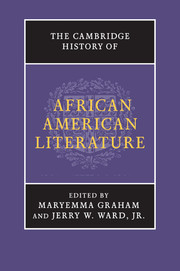Book contents
- Frontmatter
- Introduction
- PART I AFRICAN AMERICAN LITERATURE FROM ITS ORIGINS TO THE TWENTIETH CENTURY
- 1 Sounds of a tradition: the souls of black folk
- 2 Early print literature of Africans in America
- 3 The emergence of an African American literary canon, 1760–1820
- 4 Dividing a nation, uniting a people: African American literature and the abolitionist movement
- 5 African American literature and the abolitionist movement, 1845 to the Civil War
- 6 Writing freedom: race, religion, and revolution, 1820–1840
- 7 “We wish to Plead our own Cause”: independent antebellum African American literature, 1840–1865
- 8 Racial ideologies in theory and practice: political and cultural nationalism, 1865–1910
- 9 The “fictions” of race
- 10 “We Wear the Mask”: the making of a poet
- 11 Toward a modernist poetics
- PART II AFRICAN AMERICAN LITERATURE IN THE TWENTIETH CENTURY
- PART III AFRICAN AMERICAN LITERATURE AS ACADEMIC AND CULTURAL CAPITAL
- Bibliography
- Index
- References
7 - “We wish to Plead our own Cause”: independent antebellum African American literature, 1840–1865
from PART I - AFRICAN AMERICAN LITERATURE FROM ITS ORIGINS TO THE TWENTIETH CENTURY
Published online by Cambridge University Press: 28 May 2011
- Frontmatter
- Introduction
- PART I AFRICAN AMERICAN LITERATURE FROM ITS ORIGINS TO THE TWENTIETH CENTURY
- 1 Sounds of a tradition: the souls of black folk
- 2 Early print literature of Africans in America
- 3 The emergence of an African American literary canon, 1760–1820
- 4 Dividing a nation, uniting a people: African American literature and the abolitionist movement
- 5 African American literature and the abolitionist movement, 1845 to the Civil War
- 6 Writing freedom: race, religion, and revolution, 1820–1840
- 7 “We wish to Plead our own Cause”: independent antebellum African American literature, 1840–1865
- 8 Racial ideologies in theory and practice: political and cultural nationalism, 1865–1910
- 9 The “fictions” of race
- 10 “We Wear the Mask”: the making of a poet
- 11 Toward a modernist poetics
- PART II AFRICAN AMERICAN LITERATURE IN THE TWENTIETH CENTURY
- PART III AFRICAN AMERICAN LITERATURE AS ACADEMIC AND CULTURAL CAPITAL
- Bibliography
- Index
- References
Summary
Despite the miscellany of restrictions hindering the freedoms of persons of African descent in antebellum United States, the oral and prtexts produced by blacks between 1840 and 1865 comprise an independent literature, following from earlier black revolutionaries' exigent insistence that “We wish to Plead our own Cause.” Mid-nineteenth-century African American texts declare an independence from traditional genres and familiar conventions of white Americans' national and ethnocentric literatures, even as they draw on the rhetorical structures of those literatures, to privilege black vernacular expressivity. One of the leading venues for the dissemination of black prculture was the midcentury black independent press, intrepid offspring of Freedom's Journal and the other earliest newspapers in the country begun by African American entrepreneurial radicals and/or devoted to the spirited articulation of black concerns. During the antebellum years, the independent black press announced its freedom from corseted description in the very range of the character and temperament of its various weekly and monthly broadsides and papers: from emigrationist to anticolonizationist; separatist, nationalist, and defiant; masculinist but not exclusively male; sometimes protofeminist; religious or secular by turn and need. Often, the names blazoned on their mastheads heralded their self-authorizing and autonomous disposition: in the 1840s, the Mystery (founded by Martin R. Delany, 1843–48); W. A. Hodges's Ram's Horn (1847–50); Frederick Douglass's North Star (1847–51), original source of Frederick Douglass's Paper, which expanded into the Liberty Party Paper (1851–63); the Provincial Freedman (1853–57); the African Methodist Episcopal Church's still active Christian Recorder; and by the end of the Civil War, the Afro-American Magazine (1859–65) and the Weekly Anglo-African (1861–62).
- Type
- Chapter
- Information
- The Cambridge History of African American Literature , pp. 134 - 153Publisher: Cambridge University PressPrint publication year: 2011
References
- 4
- Cited by

